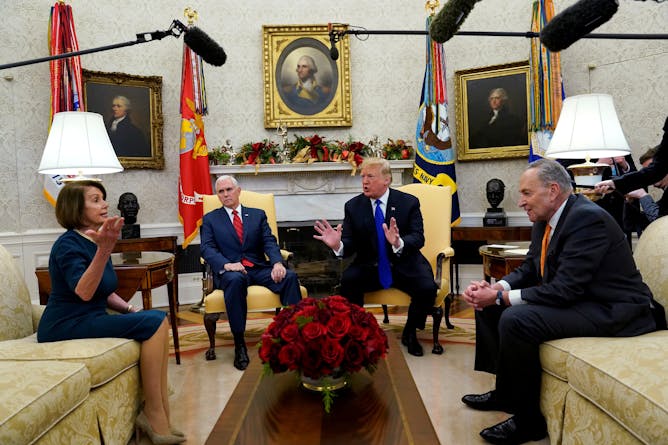|
|
|
Editor's note
|
|
The 1965 pop hit “Dirty Water” is still a Boston anthem, but today Boston Harbor – once fouled with sewage and industrial chemicals – is one of the city’s jewels. Marine biologist Michael Moore, who has studied tumors in Boston Harbor winter flounder since the mid-1980s, recounts how a multibillion-dollar cleanup produced enormous payoffs for marine life and humans. “I would not have eaten fish from Boston
Harbor 30 years ago, but I would eat them today,” he writes.
The latest effort to end the nearly three-week-old partial government shutdown failed yesterday after President Trump stormed out of a meeting with Democratic leaders, tweeting that it was a “total waste of time.” During the negotiations, both sides reiterated their positions: Trump wants a wall, Democrats don’t. The problem, according to negotiation expert Parker Ellen, is that focusing on positions suggests the outcome is zero-sum, with one winner and one loser. Instead, Ellen recommends both sides emphasize their underlying interests, which is more likely to lead to cooperation – and the shutdown’s end.
Some philanthropy experts are questioning how foundations and big donors give to charity. “While it might seem ungrateful for the rest of us to do anything but cheer about boatloads of money being given away, there are legitimate reasons for concern,” observes David Campbell, who teaches about giving and nonprofits at Binghamton University. Chief among them is a reluctance to fund efforts that could cost rich people some of the
advantages they possess.
|
Jennifer Weeks
Environment + Energy Editor
|

|
|
Top stories
|

Hull Peninsula and part of the Boston Harbor Islands National Recreation Area.
Eric Kilby/Flickr
Michael Moore, Woods Hole Oceanographic Institution
A few decades ago Boston Harbor was one of the nation's dirtiest water bodies. Now, healthier fish in the harbor underscore that a multibillion-dollar cleanup has succeeded.
|

Trump meets with Schumer and Pelosi at the White House in December.
Reuters/Kevin Lamarque
Parker Ellen, Northeastern University
Trump, Schumer and Pelosi have fallen into a classic negotiation trap that often prevents deals from getting made, which has led to the shutdown stalemate.
|

Michael Bloomberg gave Johns Hopkins $1.8 billion in 2018.
AP Photo/Patrick Semansky
David Campbell, Binghamton University, State University of New York
When the only fixes getting funded are designed to leave the status quo intact, the results of philanthropy inevitably fall short.
|
Science + Technology
|
-
Scott Shackelford, Indiana University
In the space beyond Earth's atmosphere, countries are focusing on nationalist pursuits and ignoring the consequences for the rest of humanity. How can we keep the peace and build a sustainable future?
-
Arthur Glenberg, Arizona State University
A new theory of language suggests that people understand words by unconsciously simulating what they describe. Repeated exposure – and the simulation that comes with it – makes it easier to act.
|
|
Politics + Society
|
-
Enrique Armijo, Elon University; Michael Blake, University of Washington; Sylvia Taschka, Wayne State University
We asked experts on ethics, constitutional law and European political history to analyze Trump's Oval Office address. Here's what they heard in his speech about 'crisis' at the US-Mexico border.
-
Meri T. Long, University of Pittsburgh
Are Democrats or Republicans more caring about others? One study of the role compassion plays in politics provides some surprising answers. And then there were the outliers: Trump voters.
|
|
|
|
|
|
|
|
|
Most read on site
|
-
Wendy Whitman Cobb, Cameron University
China just became the first country to land a probe on the far side of the moon. It's a technological achievement and another sign of China's capabilities and ambitions in space.
-
Gaurav Khanna, University of Massachusetts Dartmouth
Feel like visiting another star system or dimension? You can do this by traveling through a spacetime portal of a black hole. But you better choose carefully. All black holes are not created equal.
-
Shensheng Wang, Emory University
Schadenfreude seems to arise out of envy and a sense of justice. But some psychologists believe a darker impulse is at play.
|
|
|
|
| |
| |
|
|
|
|
|
|
|